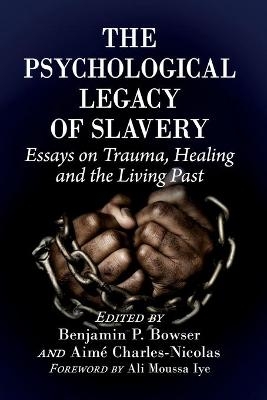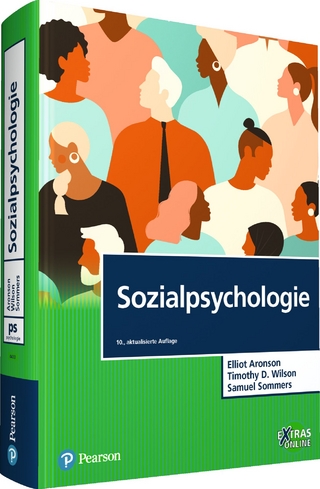
The Psychological Legacy of Slavery
McFarland & Co Inc (Verlag)
978-1-4766-7893-1 (ISBN)
This collection of essays surveys the practices, behaviors, and beliefs that developed during slavery in the Western Hemisphere, and the lingering psychological consequences that continue to impact the descendants of enslaved Africans today. The psychological legacies of slavery highlighted in this volume were found independently in Brazil, the U.S., Belize, Jamaica, Colombia, Haiti, and Martinique. They are color prejudice, self and community disdain, denial of trauma, black-on-black violence, survival crime, child beating, underlying African spirituality, and use of music and dance as community psychotherapy. The effects on descendants of slave owners include a belief in white supremacy, dehumanization of self and others, gun violence, and more.
Essays also offer solutions for dealing with this vast psychological legacy. Knowledge of the continuing effects of slavery has been used in psychotherapy, family, and group counseling of African slave descendants. Progress in resolving these legacies has been made as well using psychohistory, forensic psychiatry, family social histories, and community mental health. This knowledge is crucial to eventual reconciliation and resolution of the continuing legacies of slavery and the slave trade.
Benjamin P. Bowser is emeritus professor of sociology and social services at California State University East Bay where he was department chair, interim dean and outstanding professor, and visiting professor at the University of Paris, La Sorbonne. Aimé Charles-Nicolas is emeritus professor of psychiatry at the Université des Antilles and University Hospital of Martinique. He is President of the Medico-Psychological Society, editor-in-chief of Journal of Psychiatry, Annales Médico-Psychologiques, and is the recipient of the Chevalier de la Légion d’Honneur (Knight of the Legion of Honor) and Chevalier des Palmes Académiques (Knight of Academic Palms).
Table of Contents
Acknowledgments
Foreword: Engaging the Silence and Healing Post-Slavery Societies
Ali Moussa Iye
Introduction: Psychological Legacies of Slavery
Aimé Charles-Nicolas and Benjamin P. Bowser
Part One: Commonalities
1. Colorism in Belize
Elma Whittaker-Augustine
2. Slavery and Psychological Trauma in the Haitian Crisis
Judite Blanc
3. Afro-Brazilian Youth: Slavery’s Influence on Crime
Andréa Máris Campos Guerra
and Ana Carolina André-Cadar
4. Slavery’s Legacy in San Basilio Palenque, Colombia
Alexandra Escobar Puche
5. Those Who Disappeared
Bernard Dossa
Part Two: Concepts
6. A Psychiatric Look at the Legacy of Slavery
Aimé Charles-Nicolas
7. Explaining Post Traumatic Slave Syndrome: Multigenerational Transmission of Trauma
Joy A. DeGruy
8. An Exploration of the Psychological Legacy of Slavery
Benjamin P. Bowser
9. The Psychological Legacy of Slavery in the United States: Trauma Derived from Centuries of Laws and Customs
Edwin J. Nichols
10. The Epigenetic Ramifications of the Trauma: Enslavement, Centuries of Chattel Slavery and Institutionalized Racism
Fatimah Jackson, Latifa Jackson and Zainab El Radi Jackson
Part Three: Solutions
11. Shattering Delusions of Slavery: Psychosocial Re-Engineering of Postcolonial Jamaica
Frederick W. Hickling
12. How to Conduct a Psycho-Social History
Benjamin P. Bowser
13. Healing the Wounds of Slavery: Potentials and Challenges
Scherto Gill
Conclusion: Recommendations and Healing, Releasing
Trauma’s Grip
Aimé Charles-Nicolas and Benjamin P. Bowser
Coda: Masters and Slaves No More
Benjamin P. Bowser and Aimé Charles-Nicolas
About the Contributors
Index
| Erscheinungsdatum | 16.04.2021 |
|---|---|
| Zusatzinfo | appendix, notes, bibliographies, index |
| Verlagsort | Jefferson, NC |
| Sprache | englisch |
| Maße | 152 x 229 mm |
| Gewicht | 404 g |
| Themenwelt | Geisteswissenschaften ► Geschichte |
| Geisteswissenschaften ► Psychologie ► Sozialpsychologie | |
| Sozialwissenschaften ► Ethnologie | |
| Sozialwissenschaften ► Soziologie ► Makrosoziologie | |
| ISBN-10 | 1-4766-7893-6 / 1476678936 |
| ISBN-13 | 978-1-4766-7893-1 / 9781476678931 |
| Zustand | Neuware |
| Haben Sie eine Frage zum Produkt? |
aus dem Bereich


